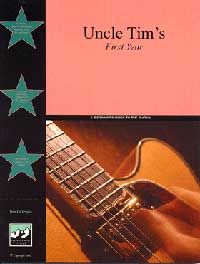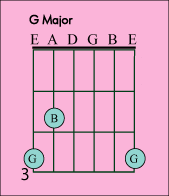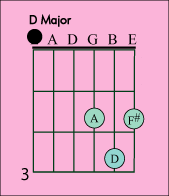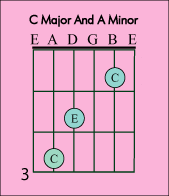

If You Are Going To Play In A Key Every Day, Shouldn't You Learn That Way?
Yes, you should!
Music is key based. You are always in one key or another. Always!
Yet playing a guitar is not taught that way! Why?
Once you understand keys and the chords and scales that come from keys, the whole world of music opens up before your eyes!
Suddenly everything is MUCH easier. And it totally makes sense when you get into it.
For $15, you can put this all to rest right now. Pick up a copy today.
eBooks are delivered instantly!
By Tim Gillespie
Okay, this one has been bugging me for a few months now. Usually I try not to make too much noise about this type of thing but lately I have been wondering how many beginners are getting fooled by this approach. What I am talking about is this.
Lately I have seen a bunch of advertisements about how you can learn to play guitar like a pro within 30 days with guaranteed results. I am not going to pick on anyone in particular, instead I want to focus on what actually happens within the first 30 days of starting to play.
My thesis point is this. The changes in a typical person in the first 30 days are only the beginning of realignment and adaptation to the instrument. In other words, in the first 30 days you are only getting a small taste of how your body will respond to this instrument. How in the world can a beginner "learn to master it" when most likely your body hasn't even quite figured out how to hold the thing yet?
Okay here is my research on this issue. It is based on watching beginners of all ages and levels of natural ability start and try to become a guitar player. As usual, I am going to break the beginners into two camps, those that play scales and those that do not. I will say this right from the very start. The group that plays scales every day, we outperform the group that does not, time and time again. Their sense of what is happening on a big scale will be better and it will continue to jump start the intellectual process. Usually when this happens these beginners start to open a gap that widens as the months go by. When I talk with them, they usually ask questions that make me think they are starting to figure things out. Here is a synopsis of what, in my opinion, happens.
A beginner usually does not know much about a guitar when they first approach it. It looks like six wires that are connected to some knobs. The first thing most guitarists try to do is learn a few chords. They usually get a few of the primary basic chords such as G, D and C. They strum these chords.



The next thing to happen is memorization. The beginner memorizes these chords and tries to play them from memory. If they are learned as a song fragment, then the beginner may try to play them so the basis of the song comes through. They want to play the song right away. Me too.
It is common to see someone do this all day at first. And there is nothing wrong with this either. It is just that there is so much to learn and such a deep tactile response to develop. This takes time to develop. And playing some chords can be a way to start this journey. But it is only the smallest of starts. Now think about what can happen next.
Usually the beginner proclaims that he or she has memorized the chords. They usually are happy to recite it back to you. They feel they really know the chords. And that memorization is over for these chords.
Now I do not suggest you do this to a new guitarist, but it is very easy to show them how well they do not know this material. For instance chords are usually memorized in some order. This can be tied directly to the song they are interested in. If you ask the person to recite them backwards, they usually have trouble. Or if you ask them to use different fingers to play the chord, they may break down. At this point I would too. Be careful about talking like this to a beginner, because you can bruise their spirits quite easily sometimes. This really is a very fragile process.
I am not trying to slam the typical beginner. In fact this is the other way around, I think the beginner process is extremely fragile and intricate and that should both be acknowledged and respected. Or you risk falling prey to failure. I characterize failing as putting the instrument away and not playing it any more. This outcome happens more than any other possibility. It is the easiest thing to do.
Some people only want to sit under a shade tree and pick a few. Other people want to be on stage. Both results require more than 30 days. Really!
The same type of thing happens to beginners that play scales. Within a few days they claim they have memorized the open string C major scale. And maybe even the G major open string scale. Usually they make a comment about how fast they can play it. If I ask them to play it any way other than how they have memorized it, they usually break down. They have no idea of how intimate they will eventually get with these scales.
Part of this is turning short term learning into long term memory. The very notion implies more than 30 days. Besides a new guitarist is usually worried more about holding down the chords properly because everything is so new. That leaves scant time for anything else. A guitarist does not even play most progressions correctly within the first 30 days. Even the easy ones.
In fact I have a friend that has been very dedicated over the last year and now has good skills in place as a result. He started out playing 30 minutes a day, he is now playing over 2 hours each day. His rate of growth has accelerated beyond anything he expected. The type of songs and the level of intricacy he is experiencing right now is well beyond what he could even have envisioned nine months ago. I know because I asked him.
His entire perception of guitar has been totally transformed. All because he engaged it. He had no idea where the journey would take him, or how long it really is. What he can do now compared to what he could do after 30 days is laughable. 30 days is still in the introductory phase of learning.
I asked him, "Do you know these scales and chords better now than a year ago?" He just smiled and laughed. Now with all he has been through he finally understands how deep the level of tactile response is. Over the last year he has been strengthening and refining his tactile response. His tool list for playing music has grown beyond what he even knew was available.
My point of all this is a person that actively engages the guitar will learn at a far greater depth than most people realize. When you look back on what you thought were actually skills acquired after two weeks, you may very well come to regard as small buds of skills just starting to emerge. It takes time to get these skills out, in shape, educated and working. And that is not going to happen in 30 days! So sorry!
I don't care how great the method is (and there are some good ones)! Most humans don't get it that quickly, myself included. Sure there are good things that can happen in the first 30 days, and much of the material offered has merit. But beginners should focus on acquiring enough skills that you actually engage the instrument and begin to get better, while staying within the fundamental aspects of the instrument. Once you understand a little you can refine your direction.
A subject as in-depth as music expressed on an instrument as complicated as a guitar, cannot be mastered in 30 days. If you even get a grip on it within the first 30 days you should be happy.
So how do you learn to play? Here is all I think you need to worry about.
1. Every beginner should play scales. Play at least 30 minutes a day to start things out. Everybody!
2. Learn some new chords every day or two. You do not have to worry about them all, just learn a few new ones on a regular basis.
3. Make sure you are playing everything with good posture and reasonable technique.
4. After a month or so, start to study simple songs with your remaining time you have left each day.
5. Start an educational process that shows you how things are connected. Remember all these musical concepts are connected. Your job with education is to identify the connections and start to use them.
Play at least one hour every day, start with scales and focus on the fundamental beginner skills that you will rely on as you get better. And take some time to build your base of knowledge. Smart, educated guitar players are more aware of what is possible. You can actually learn to play without it, but it is invaluable in the long run.
If you can learn some songs you like. This may be the easiest way to learn them at first. Learn them and repeat them as many times as possible over as many days as possible. Same for the scales and chords. Keep it basic, and play every day, building your knowledge base and your muscle response.
I would not invest any time in reading sheet music, even if you intend to learn to read notation at some point. Start by keeping your fingers on the instrument and educating your brain. You can always add reading music as you go.
That in a nutshell, is what I suggest. If you are motivated, there are many things you can do to accelerate your program. You could add a good book like Uncle Tim's First Year and kick it up in the education department. You could hire a teacher to make sure your habits are developing correctly. In addition you can have an accomplished teacher show you what to learn and how to do it over a period of time. If you pick a good teacher, you can be miles ahead in no time at all.
You can try one of a million ways to get started. But I would focus on beginner strategies, not courses that will teach you tricks that are guaranteed to get you on The Dave Letterman show. After you can actually play and grow some idea of what music is really about, then you can pour it on with the specialty stuff. But first learn how to actually play.
I am sure these 30 day methods actually do produce some guitar players, but I would be very careful about tying my future into these approaches. Think how people feel after they have played using these methods for 30 days, and they cannot wail like the pros. Their real life experience did not match the expectations set in the beginning. Usually the beginner thinks its' all their fault too.
Think about this the next time you see someone play who is really good. How long do you think they have been playing? How much work do you think it took them to get that good? How much of that skill do you think they built up within the first 30 days?